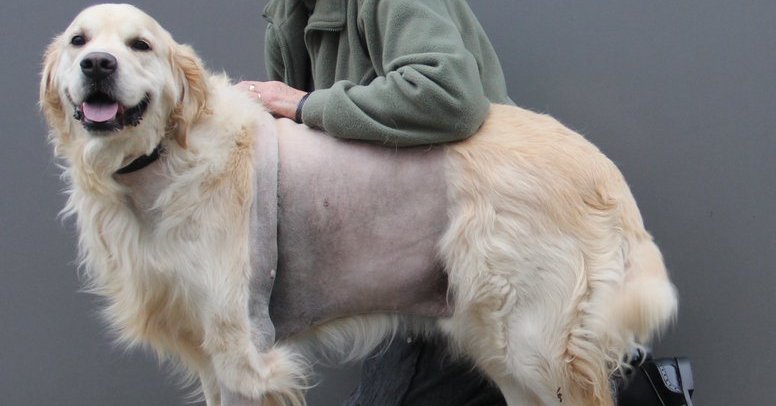
Back in April, for no obvious reason, Butler suddenly lost interest in life. He stopped eating, and lay around the house with his head between his paws. He looked miserable. When Veronica brought him to see me, there were no obvious pointers towards what was wrong. Butler was just quiet and sad. He dragged himself around the place rather than charging with his usual enthusiasm. It was as if his battery had run flat.
butler had lots of tests
I did blood samples to check his internal metabolic processes but everything was normal. It was obvious that something was seriously amiss, so x-rays and ultrasound examinations were next, and these revealed the cause of his problem. He was suffering from a rare form of heart disease. The good news was that it was a type of heart disease that can be successfully treated.
The condition is known as a “pericardial effusion”. Dogs’ hearts (like all animals, including humans) are enclosed inside a lining which resembles a plastic bag: it’s called the pericardium. This keeps the heart separate from the lungs and other structures inside the chest. It produces a type of lubricant from its inner surface which surrounds the heart, allowing it to beat friction-free, for many years. Sometimes, for reasons that remain unknown, the pericardium produces far too much of this lubricating fluid, filling up with it like a plastic bag full of water. This is known as a “pericardial effusion”. This excessive fluid smothers the heart, putting pressure on it, and stopping it from beating properly. If the condition is not treated urgently, dogs die from heart failure.
treatment
There are two stages of treatment. The first is the simplest: using guidance from ultrasound, a needle is inserted through the chest wall, then its tip is pushed into the sac around the heart. The excess fluid is then simply sucked out. As soon as this was done, Butler felt much better: his energy and appetite returned, and it seemed that he’d been completely cured.
Butler stayed in good health all summer, but in late August, the signs recurred: he was miserable and he stopped eating. This time the diagnosis was made at once, and he was referred in to UCD for the drainage procedure to be repeated.
an operation was needed
Again, he made a quick recovery, but when the same problem recurred in November, it was obvious that the next stage of treatment was needed. Butler was admitted to the UCD veterinary hospital for this procedure: it was a type of heart surgery. His chest was cut wide open, and the pericardial sac (the bag around the heart) was carefully cut out completely and removed. Once this has been done, the fluid can no longer gather around the heart, and the problem is usually completely fixed for the long term. But it was major surgery, with significant risks.
The good news is that Butler came through the operation well. He went home two days later, and he’s been in great form ever since. When I saw him for his post-operation wound check this week, it was difficult to keep him still. He is back to having full-on, uncontrollable, vigorous, young adult dog energy.
Veronica is now hoping that he’ll never have heart problems again. Most dogs manage well without a pericardial sac: like the appendix, it’s a part of the body that seems to be optional.
From the rate that Butler is now dashing around, he isn’t missing the absent part of his anatomy at all. His heart is working normally, and his energy levels have never been higher. His broken heart has been fixed and he’s feeling good.




1 Comment
I had a flatcoated retriever who had this condition, he had 2 episodes which were drained, on the 3rd episode he had major heart surgery and lived a full life until he died from Cancer at 2 months off 11 years
Please note that I am unable to answer veterinary questions in comments. If you have questions or concerns about your pet's health it is always better to contact your vet.